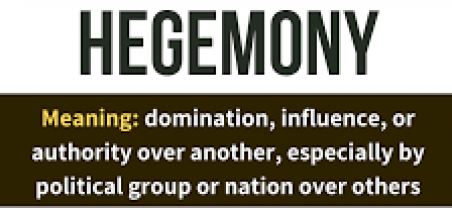By Sajeeb Sarker
Hegemony
Media School August 9, 2020

People also, especially men, often behave in hegemonic ways.
During 8th century BC and 6th century AD in Greece, popularly known as ancient Greek era, hegemony meant the politico-military dominance or control of a city-state over other city-states. In today's world, the term hegemony refers to the political, economic, or military predominance or control of one state over others.
Since the advent of the 19th century, hegemony has started to be explained as the social or cultural predominance or ascendancy by one group within a society or milieu. Later on, hegemony came to be known as a situation where a group or regime exerts undue influence within a society. Now-a-days, hegemony is often used to denote the geopolitical and the cultural predominance of one country over others.
Two related terms with hegemony are 'hegemon' - the dominant state that controls others, and 'hegemonism' - the idea that 'bigger or greater powers' are meant to establish their hegemony over 'weaker states' (i.e. Western hegemony over Eastern countries).
It is also possible for a person to become hegemonic. For example, men are usually hegemonic (i.e. controlling) over women in most cases.
Resources and usful readings
Anderson, Perry (2017). The H-Word: The Peripeteia of Hegemony. London: Verso.
Beyer, Anna Cornelia (2010). Counterterrorism and International Power Relations. London: I. B. Tauris. ISBN 978-1-84511-892-1.
Bullock, Alan; Trombley, Stephen, eds. (1999). The New Fontana Dictionary of Modern Thought (Third ed.). London: HarperCollins.
Chernow, Barbara A.; Vallasi, George A., eds. (1994). The Columbia Encyclopedia (Fifth ed.). New York: Columbia University Press. ISBN 0-231-08098-0.
Clayton, T. (2006). Rethinking Hegemony. James Nicholas Publishers.
Cook, Chris (1983). Dictionary of Historical Terms. London: MacMillan. ISBN 0-333-44972-X.
DuBois, T. D. (2005). "Hegemony, Imperialism and the Construction of Religion in East and Southeast Asia". History & Theory. doi:10.1111/j.1468-2303.2005.00345.x.
Eagleton, Terry (1991). Ideology: An Introduction. London: Verso.
Holsti, K. J. (1985). The Dividing Discipline: Hegemony and Diversity in International Theory. Boston: Allen & Unwin. ISBN 0-04-327077-8.
Hopper, P. (2007). Understanding Cultural Globalization (1st ed.). Malden, MA: Polity Press. ISBN 978-0-7456-3557-6.
Howson, Richard, ed. (2008). Hegemony: Studies in Consensus and Coercion. Psychology Press. ISBN 978-0-415-95544-7.
Joseph, Jonathan (2002). Hegemony: A Realist Analysis. Routledge. ISBN 0-415-26836-2.
Kissinger, Henry (1994). Diplomacy. New York: Simon & Schuster.
Larsen, Henrik Boesen Lindbo (2019). NATO's Democratic Retrenchment: Hegemony After the Return of History. Routledge. ISBN 9781138585287.
Mayr, A. (2008). Language and Power: An Introduction to Institutional Discourse, A & C Black.
Nye, Joseph S., Sr. (1993). Understanding International Conflicts: An Introduction to Theory and History. New York: HarperCollins. ISBN 0-06-500720-4.
Slack, Jennifer Daryl (1996). "The Theory and Method of Articulation in Cultural Studies". In Morley, David; Chen, Kuan-Hsing (eds.). Stuart Hall: Critical Dialogues in Cultural Studies. Routledge.
Schenoni, Luis L. (2019). "Hegemony". Oxford Research Encyclopedia of International Studies. Oxford University Press.
The Grand Strategy of the Roman Empire: From the First Century AD to the Third. Baltimore: Johns Hopkins University Press, 1976.
Zhiqun, Zhu (2006). US-China relations in the 21st century : power transition and peace. London; New York: Routledge. ISBN 0-415-70208-9.
Dictionaries
Oxford English Dictionary
Oxford Advanced American Dictionary
Oxford Research Encyclopedia of International Studies
Merriam-Webster Online Dictionary
American Heritage Dictionary


